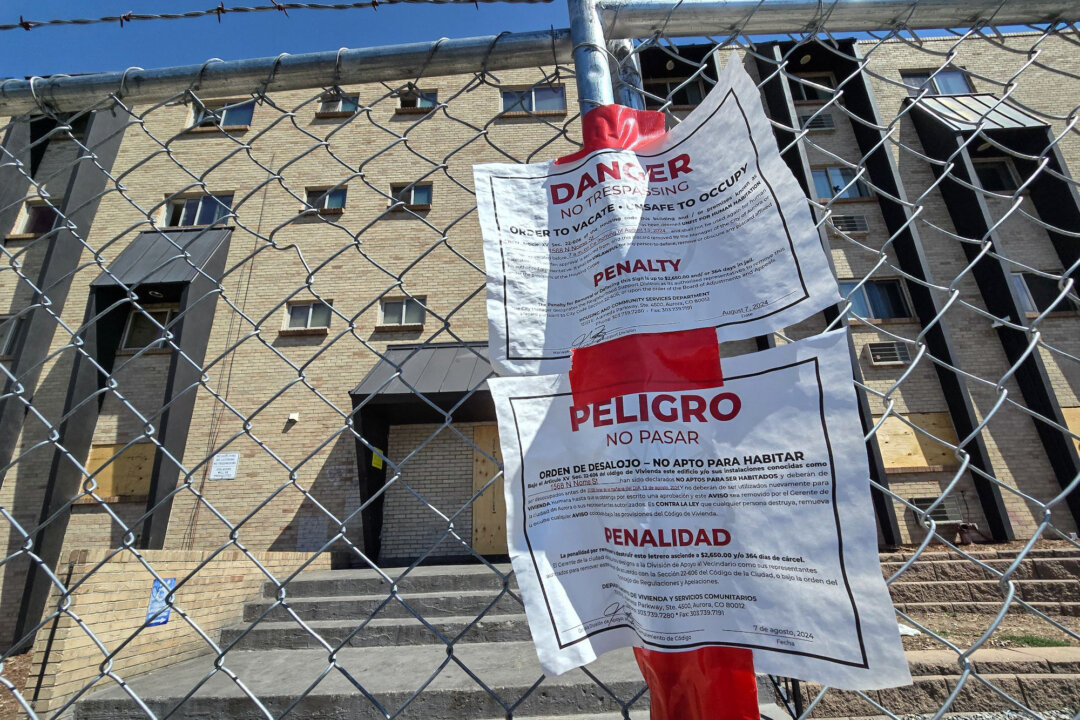The Trump campaign described Aurora as a ‘war zone’ as a result of ‘violent Venezuelan prison gang members from Tren de Aragua’ coming into the city.
Claims that Aurora, Colorado, has been overrun by Venezuelan gangs are “grossly exaggerated,” and the city is “considerably safe,” Aurora Mayor Mike Coffman said on Tuesday, just days before former President Donald Trump is set to visit.
Trump, the Republican presidential nominee, is set to visit Aurora on Friday and hold a rally at the Gaylord Rockies Resort and Convention Center, according to his campaign.
“Former President Trump’s visit to Aurora is an opportunity to show him and the nation that Aurora is a considerably safe city—not a city overrun by Venezuelan gangs,” Coffman said in a statement. “My public offer to show him our community and meet with our police chief for a briefing still stands.”
In announcing the upcoming visit, the Trump campaign described Aurora as a “war zone” due to the “influx of violent Venezuelan prison gang members from Tren de Aragua.”
Tren de Aragua engages in criminal activities such as human smuggling and trafficking, money laundering, and illicit drug trafficking, according to the U.S. Department of the Treasury.
“With approximately 43,000 migrants flooding the neighboring city of Denver since December 2022, many of these migrants have made their way to Aurora, bringing chaos and fear with them,” the campaign said.
Trump’s campaign said that local families in Aurora have been forced to flee their homes as Tren de Aragua members “terrorize apartment complexes with guns, theft, and rampant drug activity.”
The campaign added that “open-border policies are turning once-safe communities into nightmares for law-abiding citizens.”
During the presidential debate with Vice President Kamala Harris in Philadelphia on Sept. 10, Trump referenced the alleged gang takeovers of apartment buildings in Aurora.
“They are taking over the towns. They are taking over buildings. They are going in violently … they’re destroying our country,” he said during the debate.
On Tuesday, Coffman said, “The incidents were limited to several apartment complexes in this city of more than 400,000 residents.”
In August, Coffman said that approximately three apartment buildings in the Denver suburb were affected by the gangs.
Although the mayor did not specify exactly which criminal organizations were allegedly taking over the buildings, he said they were Venezuelan.
The mayor stated that the city had set up a task force of local, state, and federal law enforcement officials to help deal with the “intimidation” of individuals who own the apartments.
The mayor said at the time that he was investigating how and why there was such a high concentration of Venezuelans in the three buildings.
“Somebody placed them there, is it an agency of the federal government, perhaps using some of our local nonprofit partners here as a conduit,” he said.
He also criticized the federal government’s actions at the border.
“It is my understanding that Venezuela does not share criminal histories with the United States, so it’s very difficult to vet them at the border, yet they’ve been allowed to come in anyway,” Coffman said at the time.
In September, Coffman and Aurora City Council Member Danielle Jurinsky sought to “clear the record,” writing in a joint statement that the Tren de Aragua (TdA) had not “taken over” the city and that issues experienced at a select few properties did not apply to the city as a whole.
“TdA’s presence in Aurora is limited to specific properties, all of which the city has been addressing in various ways for months,” the joint statement said.
They also said that the Aurora Police Department had arrested eight out of 10 people linked to the gang.
Two of the individuals arrested were involved in a July shooting at one of the specific properties in the city that have experienced issues with Tren de Aragua activity, Coffman and Jurinsky said.
“In line with these arrests, we can also now confirm that criminal activity, including TdA issues, had significantly affected those properties,” they wrote.
The Epoch Times contacted the Trump campaign for comment but didn’t receive a reply by publication time.

